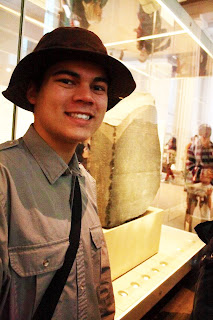Adam Smith wrote about and
interesting topic in his Wealth of Nations, the idea of specialization
and trade. There was, as the time, a
prevailing worldview that said it would be better for countries to be
self-sufficient rather than being interdependent with each other. The rationale behind that was that if two
countries went to war with each other and one was dependent on the second for
their export of some good then the second country would have power over the
first. So the idea of a trading
relationship would become a liability in the event of a war. So there was relatively little trade during
that time. Smith wrote that it is better
if countries traded because different countries were better suited to the
production of different things. Florida
is better suited to making oranges and exporting them to the rest of the world
and importing its cars from Japan, its DVD players from China, and its cheese
from France. Of course, those different
countries would be better off importing their oranges from Florida than trying
to grow that crop themselves. This
achieves several things besides the fact that different countries are better
suited to making different goods (and thus can produce those goods more
efficiently than other places). One of
things is called “economies of scale” and it is a subset of efficiency. “Economies of scale” is the idea that when a
larger quantity of something is produced, it costs less to produce them.
Every once in a while, when I have free time, I do
projects for fun. I made an iPod case
and it took a couple months. It had a
frame made from copper pipes and had leather sewn onto it. The reason it took so long was because it was
so complex, with a lot of specific processes. Unlike most projects, where I
only make one, I made to this time: one for myself and one for my friend. Since I was making two instead of one, it
took less time on average to make each one.
Instead of having to go through the whole process twice, I only had to
do it once and was able to just execute the steps on twice as many materials. I would take the drill out and cut holes in
two pipes rather than just one and saved time over making once completely and
then doing it all over again. Say it
took 20 hours to make one by itself and 30 hours to make two. (This sounds about right.) On average, it only took 15 hours to make
each case when I made two, which is a 25 percent increase in efficiency over
just making one. That is economies of
scale working on a small scale and it is basically a long explanation of what
is a really intuitive concept if you think about it.
The gains from an economy of scale are best seen on a
large scale. Think about a clothing
factory. When a person makes his own
clothing individually, it is very expensive.
Say it costs 1000 dollars to make that first shirt between the machine,
electricity, fabric, and the cost of the time spent on it. Then when the second shirt comes out it costs
much less because the machine is already there, so it only costs as much as the
electricity and fabric. The third and
fourth and so on are the same. The
average cost (taking the price of the sewing machine into account) goes down
with each shirt that is produced. It
still take a long time for one man with one machine to make a shirt, but the
cost does go down over the course of time.
Now think of a factory that can make thousands of shirts every day. The factory itself is really expensive to
start up and it costs a lot to hire all of the workers. But after a while, it costs an average of
very little for each shirt to be made.
So the factory can make a thousand shirts much faster than a thousand
tailors and for substantially cheaper than hiring a thousand tailors to make
them. Now when it costs less, the savings are passed on to consumers who can buy shirts for just a few dollars depending on the kind. Even more expensive shirts cost substantially less than they would if they had to be custom made. With the savings, more of a person's money is freed up for him to buy other things that he wants.
Finally, think of how great it is that just about everything we use, from laptops to clothes and food to automobiles are mass produced with technology that makes it inexpensive and by people who are good at making those things. Now think of how it would be if we each had to make everything ourselves or get it custom made. We would probably go back to being hunter-gatherers.


